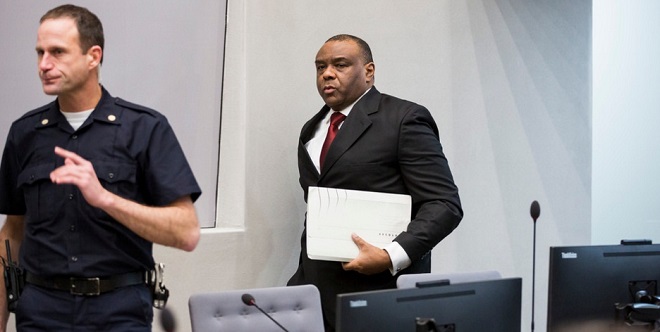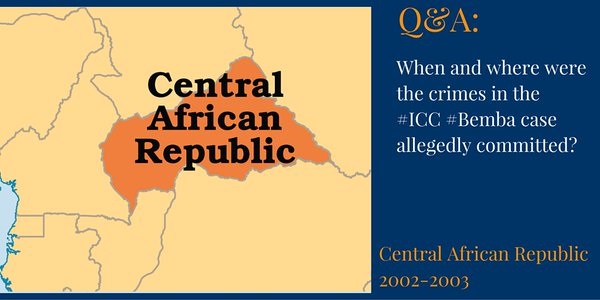
Kinshasa, DR Congo | AFP |
Jean-Pierre Bemba, the ex Congolese vice-president handed an 18-year-jail term Tuesday for “cruel” rapes and murders in neighbouring Central African Republic, was once a towering figure in business and politics.
Bemba, a once feared warlord now aged 55, was sentenced after being found guilty in March by the International Criminal Court (ICC) in The Hague.
The war crimes tribunal said the one-time vice president had failed to deter rapes, killings and looting by his private army in 2002 and 2003 in CAR.
Bemba’s case was the first before the ICC to focus on sexual violence as a weapon of war and the first to underline a military commander’s responsibility for the conduct of troops under his control.
Bemba, who became vice president of an interim government from 2003 to 2006, was born on November 4, 1962 in Bogada in the northwest Equateur province of what is now Democratic Republic of Congo.
Bemba’s father was a rich businessman close to dictator Mobutu Sese Seko, who ruled from 1965 until his ousting in 1997 and named the country Zaire.
Young Bemba was schooled in Belgium, the former colonial power, and went on to take over family businesses, using his popularity in the capital Kinshasa to build on his wealth and expand into sectors such as mobile phones, air freight and television.
A former business associate described the heavy-set Bemba, an imposing 1.90 metres (6 foot 3 inches) tall, as “too impulsive, too authoritarian as a boss.
“The social side was not his strong suit,” the source added.
Even so, nine years after going into exile Bemba continues to enjoy support in Kinshasa, especially among members of his former MLC militia, now a political party.
“I feel bitter towards the ICC,” MLC member Daddy Kondo told AFP after the verdict, accusing the court of “neocolonialism”.
Another militia member, Jean Faustin Isenge, dubbed the verdict and sentence “shameful” and added “I no longer believe in this court.”

Miniature Mobutu
MLC official and lawmaker Delly Sesanga, who ran Bemba’s office while the latter was vice president, labelled the man nicknamed the “chairman” as well as a “miniature Mobutu” as an intelligent leader albeit with an impulsive trait which “can lead to mistakes.”
Bemba left Kinshasa in 1997 when the late rebel leader Laurent Desire Kabila, father of current President Joseph Kabila, overthrew Mobutu and gave the country its current name.
A 1998-2003 war drew foreign armies on rival sides into the vast central African nation with fabulous mineral wealth.
Bemba became leader of the Congolese Liberation Movement (MLC) rebels, a 1,500-strong force backed by neighbouring Uganda and opposed to the Kabila regime.
Pride in bush years
Bemba has spoken with pride of his years in the bush, where his men controlled Equateur province and the border region with the Central African Republic.
Bemba sent his fighters into CAR in October 2002 to help put down an attempted coup against then president Ange-Felix Patasse, sparking a months-long campaign of horrific abuses by MLC troops against the civilian population.
After the Congolese war ended in 2003, Bemba laid down his arms and was awarded one of four vice-presidential posts shared out among wartime rivals in a transitional government.
In 2006, he lost a presidential run-off against young soldier Joseph Kabila, who had been rushed to power by politicians after the 2001 assassination of his father.
After the poll defeat, Bemba vowed to lead the opposition and was elected to the national Senate.
However, he refused to let his militia be integrated into the ranks of the regular army, insisting he needed the MLC to ensure his own safety.
In March 2007 an armed stand-off erupted into violence in Kinshasa, claiming at least 300 lives, according to the United Nations.
As the government brought charges and the courts began to move against Bemba, he quit the country, ostensibly to seek medical treatment in Portugal.
He left Kinshasa escorted by UN armoured vehicles on April 11, 2007.
Until his arrest in Brussels in May 2008 on an ICC warrant, Bemba lived between Portugal and Belgium in what he called “forced exile”, insisting he would yet return home to take up an opposition role.
Bemba denied guilt throughout a trial which began in 2010 and his lawyers said Monday he would appeal the verdict.
 The Independent Uganda: You get the Truth we Pay the Price
The Independent Uganda: You get the Truth we Pay the Price





